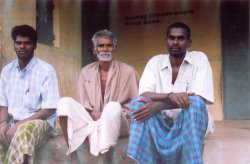Village “Vadaku Poigai Nadutheru”, Nagapattinam, Tamil Nadu: What happens to families whose professions are circuitously linked to that of the fishing community? In this village, most of the families whose work revolved around the fishing community have been left bereft of work ever since the tsunami hit their coast on December 26, 2004.
By Praveena Shivram
Village “Vadaku Poigai Nadutheru”, Nagapattinam, Tamil Nadu: What happens to families whose professions are circuitously linked to that of the fishing community? In this village, most of the families whose work revolved around the fishing community have been left bereft of work ever since the tsunami hit their coast on December 26, 2004.
The village mainly comprises carpenters who repair boats, `Idli’ (rice pancake) makers who sell their ware to fisherfolk, their customers and other passers-by or work and tailors. The tsunami might not have destroyed their houses but the killer waves have, in their own manner, managed to wreck their lives. Most of the villagers are victims of the tsunami and little thought has been given to their future either by the government or the many the NGOs. Their professions have suddenly vanished – as if pulled into the sea!
Umapathy Chellain, belonging to a family of carpenters who repair boats, is glad that he escaped unscathed. “We were all working on the shore when the wave came in,” he recalls. We just dropped everything on the shore and ran for our lives! Each one of us was thrown into a different direction and we have lost some of our fellow workers. I saw one of my co-workers lifted with a boat and thrown on to the roof of a house! It was horrible! We all held on to trees and managed to save ourselves. When the tide receded, we saw that all our cycles and tools had been washed away.”
Iswari Tamizhselvam is a tailor by profession who had set up his little work station on the shores of the coastal village of Akarapettai in Nagapattinam. “I was in the middle of my work when I heard someone scream that the water is coming. I just had to leave everything as it was and run for my life. Now my sewing machine is gone and for over a month I have just been idling my time at home.” Her husband, a carpenter who repairs boats, is also out of work.
For Rathiamma Ramaih, a single mother (her husband passed away a few years back), the tsunami took away two professions. Her own and her son’s. She used to eke out a meagre living by selling “idlis” on the shores of the Akaraipettai. Barely able to keep her tears in check, she says, “In all the panic and chaos that ensued, I lost all my utensils and a small tin in which I was carrying all my money.” Her son, a boat carpenter, lost his tools and his cycle.

How does one deal with such variegated professions, all of whom survived on the shores? To begin with, Oxfam GB is giving 20 carpenter families tool kits, with 19 tools in each kit. “No government agency or any other NGO has looked after us after the tsunami,” says Sahadevan, Umapathy’s brother. I remember how we ran after relief vans begging for biscuit packets to feed our children. It was only the people from Oxfam who even noticed us and got us all the relief materials. And now we are getting new tool kits. I now have renewed hope that our families will survive this onslaught.”
Sahadevan adds, The most I can do, till fishermen get their new boats, is to move into town and work as a helper to other boat repairing carpenters.”
With so many damaged boats lining the coast, one would have assumed that this particular profession would be relatively better off than the rest. But Umapathy disagrees. ” Most of the boats are beyond repair. Even if we did our best, the boats wouldn”t be sturdy enough to handle the rough sea.”
Yudhvir, programme officer with Oxfam, says his organization learned of this village quite by chance. “We met someone from this village while on our way to another village and were told that there was a village next to Akaraipettai which needed help. That is how we arrived here.”
Apart from the 20 individual tool kits, Oxfam has also given the village a common tool kit so that more carpenters can use it. Alfred Arunkumar, a project officer with Oxfam, is happy with the response from the village. “There are other requirements for different occupations here. We are assessing these, in collaboration with our local partner NGOs, and will be addressing them. One of our main programmes after the initial relief work is going to be on rehabilitation of livelihoods.”



